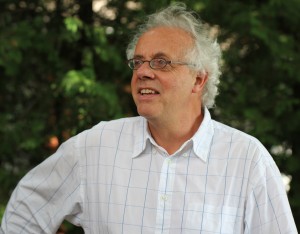 Is poverty yet another word that is so misunderstood we should stop using it—at least in Britain? John Lanchester, a friend of mine, argued so in the Observer. Can he possibly be right?
Is poverty yet another word that is so misunderstood we should stop using it—at least in Britain? John Lanchester, a friend of mine, argued so in the Observer. Can he possibly be right?
Lanchester doesn’t seem to be arguing that we should stop using the word poverty when we mean “absolute poverty.” When the Millennium Development Goals were set absolute poverty was defined as having to live on an income of less than $1 a day, but subsequently it was raised to $1.25. In 1980 half the world’s population lived below that line, now it’s a fifth—1.2 billion people. Few people, if anybody, would dispute that having to live on such an income is to live in poverty. Using this measure, Asia might be expected to eradicate poverty by 2030, but the Asian Development Bank has just argued that the rate should be $1.51, meaning that nearly 60% of the population of Bangladesh—a country I visit regularly—is living in poverty.
In contrast, poverty in Britain is defined relatively: as a household having an income less than 60% of median income. That’s a threshold that can change day by day, but currently it’s £13 920 a year. The reference point for a household is two adults, which means an income for each person of £19.5 or $31 a day.
Lanchester’s first argument for abandoning the word poverty is that “relative poverty” is confusing to people and not how they understand who is poor. The numerate well understand that as median income falls—as it did by 8% after the financial crisis—then the number of people in poverty falls. That’s counterintuitive to most people: overall we’re poorer, but the number of people in poverty has fallen. A family may be “in poverty” one day but “out of poverty” the next day, when for them nothing has changed.
The more substantial, and more contentious, argument of Lanchester’s is that many people in Britain simply don’t believe a household with an income of £13 920 is living in poverty. They don’t accept that 13 million people in Britain are living in poverty. For most of the population, living in poverty means having less than “what is necessary for subsistence,” the Beveridge definition. You need to be fed, clothed, and housed at a basic level, but you don’t need a television, a mobile phone, a holiday, and toys for your children.
Lanchester observes that more than twice as many people think cuts are necessary than think them unnecessary, and that an increasing proportion think them good for the economy. He concludes that “what these numbers imply . . . is a lack of belief in the narratives about poverty and hardship in the UK. The Great British Public doesn’t really think times are as difficult as people say they are.”
A novelist by background, Lanchester also observes that “in the Judeo-Christian tradition, poverty is close to being a virtue.” Blessed are those of you who are poor for yours is the kingdom of God, while it is easier to pass a camel through the eye of a needle than for a rich man to enter into the kingdom of God. (For the rich man, my brother has a tip: “use a blender.”) Pretty much every saint is poor, says Lanchester. Plus Jesus observed that “the poor you will always have with you.”
So these are the problems for poverty campaigners in Britain: people don’t understand relative poverty, don’t accept that there is much poverty, and may well think it virtuous and to some extent inevitable (it’s a given).
I’m mildly obsessed with how overused words (innovation, quality, privatisation, integrated, terrorist) can lose their meaning and usefulness, but a usually insuperable problem is to come up with better words that are widely understood and accepted.
Lanchester wants us to use “inequality” rather than poverty. He argues that people will not accept that “rising inequality is a fact of life,” with the implication that unacceptability will galvanise political action in a way that reducing poverty does not. Most economists, he says, think we are moving in Britain towards a society in which nobody is poor in the subsistence sense, but which is feudal in that there is a minority of rich people but most people are relatively poor. Perhaps for lack of space, he doesn’t quote the work of Richard Wilkinson and Kate Pickett into how inequality is the cause of most bad things—poor health, inadequate education, and crime.
But I’m sceptical that inequality will be better than poverty in producing the “sustained pressure on politicians” that Lanchester hopes for. One problem is that nobody can imagine a world in which everybody is equal. Some are tall, some short; some are bright, some stupid. Inequality is built into our understanding of the world. Then there is the same measurement and understanding problem as with relative poverty: will people fight for a Gini coefficient of zero? Then I heard this morning a radio commentator dismiss a trade unionist asking for more equality as “the politics of envy rather than aspiration.” Even outside of America the dream is alive that a poor man can become president or at least rich.
Perhaps the conclusion is that we can’t rely too much on single words. Rather we need to paint pictures of how grim the severe deprivation of poverty in Britain can be, or how miserable it is—even for the rich—to live in a world of gross inequality.
Richard Smith was the editor of The BMJ until 2004. He is now chair of the board of trustees of icddr,b [formerly International Centre for Diarrhoeal Disease Research, Bangladesh], and chair of the board of Patients Know Best. He is also a trustee of C3 Collaborating for Health.
Competing interests: Nothing further to declare.
